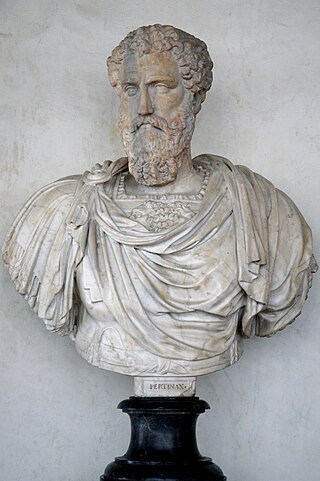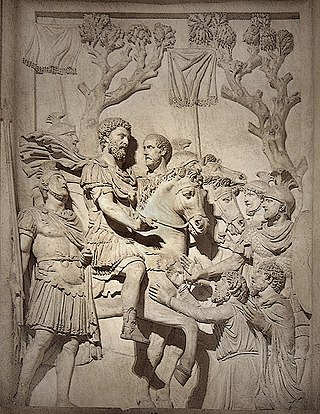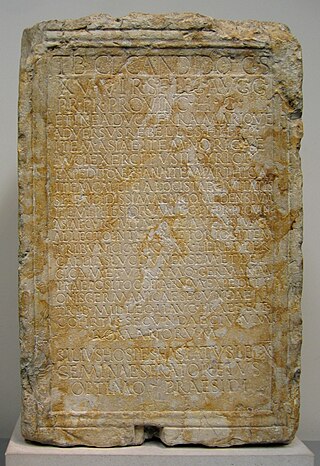
Lucius Septimius Severus was Roman emperor from 193 to 211. He was born in Leptis Magna in the Roman province of Africa. As a young man he advanced through the customary succession of offices under the reigns of Marcus Aurelius and Commodus. Severus was the final contender to seize power after the death of the emperor Pertinax in 193 during the Year of the Five Emperors.

The 2nd century is the period from AD 101 through AD 200 (CC) in accordance with the Julian calendar. It is considered part of the Classical era, epoch, or historical period.
The 180s decade ran from January 1, 180, to December 31, 189.
The 190s decade ran from January 1, 190, to December 31, 199.
Year 195 (CXCV) was a common year starting on Wednesday of the Julian calendar. At the time, it was known in Rome as the Year of the Consulship of Scrapula and Clemens. The denomination 195 for this year has been used since the early medieval period, when the Anno Domini calendar era became the prevalent method in Europe for naming years.

Gaius Pescennius Niger was a Roman usurper from 193 to 194 during the Year of the Five Emperors. He claimed the imperial throne in response to the murder of Pertinax and the elevation of Didius Julianus, but was defeated by a rival claimant, Septimius Severus, and killed while attempting to flee from Antioch.

Publius Helvius Pertinax was Roman emperor for the first three months of 193. He succeeded Commodus to become the first emperor during the tumultuous Year of the Five Emperors.

Marcus Didius Julianus was Roman emperor from March to June 193, during the Year of the Five Emperors. Julianus had a promising political career, governing several provinces, including Dalmatia and Germania Inferior, and defeated the Chauci and Chatti, two invading Germanic tribes. He was even appointed to the consulship in 175 along with Pertinax as a reward, before being demoted by Commodus. After this demotion, his early, promising political career languished.

Decimus Clodius Albinus was a Roman imperial pretender between 193 and 197. He was proclaimed emperor by the legions in Britain and Hispania after the murder of Pertinax in 193. Initially Albinus cooperated with another contender for the throne, Septimius Severus, but the two turned on each other in 196 and commenced a civil war. Albinus died in battle the following year.

Tiberius Claudius Pompeianus was a politician and military commander during the 2nd century in the Roman Empire. A general under Emperor Marcus Aurelius, Pompeianus distinguished himself during Rome's wars against the Parthians and the Marcomanni. He was a member of the imperial family due to his marriage to Lucilla, a daughter of Marcus Aurelius, and was a key figure during the emperor's reign. Pompeianus was offered the imperial throne three times, though he refused to claim the title for himself.

The Battle of Lugdunum, also called the Battle of Lyon, was fought on 19 February 197 at Lugdunum, between the armies of the Roman emperor Septimius Severus and of the Roman usurper Clodius Albinus. Severus' victory finally established him as the sole emperor of the Roman Empire following the Year of the Five Emperors and immediate aftermath.

The Battle of Nicaea was fought in 193 between the forces of Septimius Severus and his eastern rival, Pescennius Niger. It took place at Nicaea in Asia Minor. Severus defeated his rival, and ended his bid for the Roman Empire the next year at Issus.

The Battle of Cyzicus was fought in 193 between the forces of Septimius Severus and his rival for the empire, Pescennius Niger, who was defeated.

The Year of the Five Emperors was AD 193, in which five men claimed the title of Roman emperor: Pertinax, Didius Julianus, Pescennius Niger, Clodius Albinus, and Septimius Severus. This year started a period of civil war when multiple rulers vied for the chance to become emperor.
Cornelius Repentinus was a Roman Senator who was active in the 2nd century AD. He held a number of positions during the reigns of emperors Marcus Aurelius, Commodus and Didius Julianus, which included suffect consul and Urban prefect of Rome.

The history of the Roman Empire covers the history of ancient Rome from the traditional end of the Roman Republic in 27 BC until the abdication of Romulus Augustulus in AD 476 in the West, and the Fall of Constantinople in the East in 1453. Ancient Rome became a territorial empire while still a republic, but was then ruled by emperors beginning with Octavian Augustus, the final victor of the republican civil wars.
Quintus Aemilius Laetus was a prefect of the Roman imperial bodyguard, known as the Praetorian Guard, from 191 until his death in 193. He acceded to this position upon the deaths of his predecessors Regillus and Lucius Julius Vehilius Gratus Julianus, by appointment of emperor Commodus. His name suggests that his family received Roman citizenship from Marcus Aemilius Lepidus.
The gens Ceionia or gens Caeionia or the Caeionii family was an ancient Roman senatorial family of imperial times. The first member of the gens to obtain the consulship was Lucius Ceionius Commodus in AD 78. The rise of this family culminated in the elevation of the emperor Lucius Verus, born Lucius Ceionius Commodus, in AD 161.
Titus Flavius Claudius Sulpicianus was a Roman statesman who served as Senator and Consul suffectus. He unsuccessfully attempted to succeed his son-in-law Pertinax as Emperor in 193.

Tiberius Claudius Candidus was a Roman general and senator. He played an important role supporting Septimius Severus in the struggle for succession following the assassination of the emperor Pertinax in 193 CE.













